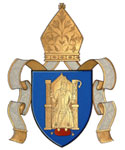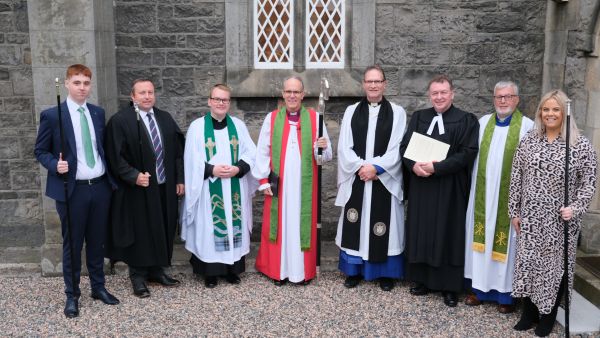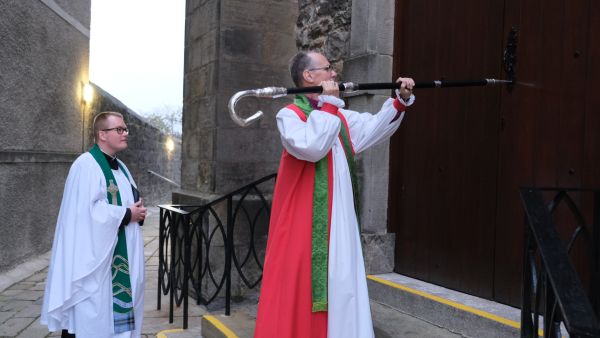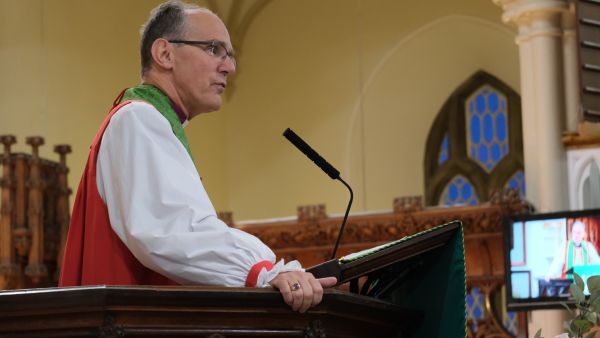 |
 |
News
Service of Enthronement of Bishop of Clogher takes place in Enniskillen Cathedral

Gathering for the Service of Enthronement of the Bishop of Clogher in Enniskillen.
The second Enthronement Service of Bishop Ian Ellis took place in St. Macartin’s Cathedral, Enniskillen on Sunday, 25th September, postponed from the earlier date of 11th September due to the death of HM Queen Elizabeth.
It was a Service of Celebration of The Holy Communion for the Enthronement of Right Revd Dr. Ian Ellis.
The hymns included; “Praise to the Lord, the Almighty, the Kind of Creation, “The Lord’s my Shepherd,” “My Jesus, my Saviour,” “Lord, enthroned in heavenly splendour,” “Be still, for the presence of the Lord,” “I am not worthy, holy Lord,” “Be known to us in breaking bread” and “Be thou my vision.” The organist was Mr. Glenn Moore.
The lessons were read by Monsignor Peter O’Reilly, Mr. Mark Ellis and Revd Chancellor Ian Berry. The Bishop was the preacher.
Prayers for clergy and people were led by Mr Sam Morrow, Hon. Secretary of St. Macartin’s Cathedral; prayers for the Eastern Church were led by Mrs Ethne McCord, Hon. Secretary of Tyholland and Errigal Truagh Union of Parishes; a prayer for the increase of the ministry was led by Mrs Julie Crawford, Principal, Clontibret National School and a prayer for schools, education and young people was led Miss Elizabeth Armstrong, Principal, Enniskillen Royal Grammar School.
The service included the celebration of Holy Communion.

Bishop Ian Ellis strikes the West Door of Enniskillen Cathedral at the start of the Service.
In his sermon, Bishop Ian thanked everyone for arranging the services and focused his thoughts on the Gospel passage and those parables on lostness of the lost sheep, the lost coin, and the lost son.
The full text of his sermon is as follows;
“I wonder have you ever lost something valuable and understand that sense of loss; I once lost my wedding ring on beach in France! I searched all afternoon turning over the sand where we had sat and came back the next day thinking the tide might have uncovered it, daft idea as that was! I even asked a guy with a metal detector to scan the area but to no avail,no happy ending. I had to buy a new one when I got home.
“These parables are good news for those who have lost something or someone important. Firstly the parable of the lost sheep and the seeking and caring shepherd emphasises the joy of God, who rejoices more over one sinner who repents than over 99 respectable people who have not committed any gross sin. The parable at another level is also an insight into the ministry of Jesus bringing the joy of God as his promised shepherd, God’s new David, doing the work of God; God intervening to restore his lost sheep.
“It’s an image very apt as we think tonight on the role of the bishop in a diocese and I have been given the great honour of being your bishop. The crozier we carry is not so much a symbol of authority but of pastoral care; it speaks of the caring and leadership role of the bishop as the chief shepherd and a symbol of unity for the diocese to gather around.
“Sheep tend to get lost I am told because of their silliness or their inquisitiveness; they nudge their way through a gap in a hedge, move off and get separated from the flock. The shepherd in the parable notices the missing sheep and leaves the flock and scours the hills for the wayward one. When he finds it, he carries it on his shoulders back to the flock.
“As we in churches move on from the pandemic when so many people have had their lives changed or disrupted at so many levels, it is not surprising that some may have lost their way, their mental health affected, lost within themselves, or their employment lost, or their relationships altered.
“In recent weeks our church leaders have called for action from our governments to address the financial losses many are going to face over this winter with crippling costs of living. It looks like the new UK Prime Minister is going to do something to address these fears. There is a real sense of impending crisis in the minds of the vulnerable and needy families across these islands with many families feeling they have lost control of their lives.
“I think there is another form of lostness right across churches; many parishioners have just lost the patterns of life they previously had. A good many lost their regular connection with the church.
“Our role as clergy and laity is just as it ever was, modelling the good shepherd, seeking, and helping those who have lost their way to find meaning, purpose, hope and restored relationships with others and perhaps with God himself. And we now must help those who have lost connection find reconnection with our churches. The challenge for us is to find ways of doing this effectively and appropriately.
“But here is where we are and where we must begin to move forward.
“This evening, I dramatically knocked the cathedral door seeking admission; that action symbolises the knock of those who are asking what the church has to offer, who seek answers to timeless questions, who yearn for hope in a seemingly hopeless world, who feel lost in the unexpected twists and turns of the journey of life. Our task is to have the doors of our churches open with welcome and to be actively seeking and drawing in those who want to find their way back to God. Otherwise, they will decide the church is irrelevant and walk away.
“Some of this opening of doors will happen naturally. Our greatest strength in the C of I is our pastoral care. Clergy can and must now begin to pick up their patterns of visiting again and begin to restore our full pastoral and sacramental ministry. Rebuilding our church life with adult, youth and children’s work and restarting in a lively way is however a work for the whole people of God not just the clergy.
“We are very fortunate to have historic links with local schools, more than ever we need to strengthen our engagement, to show that the church highly values education, pastoral care and takes seriously its role in community life. Principals, teachers, governors, and parents need our support and our prayers. The English word ‘education’ comes from the Latin educare, ‘to lead out’. It’s about leading out the talents of young people and leading the community forward in its development and growth. Education in any society is critical to its well-being. We will help our parishes and school communities move forward as we engage with our local schools, it is good to be reminded about that tonight as some principals of schools in the diocese take part in our intercessions.
“The second image Jesus uses is moved from working outdoors to indoors, he speaks of a woman who has lost one of ten silver coins, biblical scholars tell us to think perhaps of a string of coins on a necklace or headband given at a special time. Jesus describes her strenuous efforts to find her missing coin. The focus of the parable is on the great efforts of the woman to find her valued item. It is about recovering a loss.
“I think it challenges us also, those who are called to care for others who get lost in life either through bad choices or through circumstances beyond their control. Have we the caring eye to look carefully and the committed heart to spend time to help those who may lose their way or whose strength of faith is weakened? There are many who will need pastoral support or our healing ministry and the caring friendship of parishioners. As parishes we must engage with wider society and bring practical help where we can whether that is through a food bank or meals for the elderly or befriending services or whatever outreach we can offer.
“During the Lambeth Conference this summer we heard a remarkable address by the Archbishop of York, Stephen Cottrell, who spoke about mission and evangelism. He urged us to think about our core mission. He made the striking point that ‘the core business of the church is to make disciples, just as the core business of McDonalds is to make burgers!’ He went on to say that ‘disciples make disciples by sharing the good news’. The word Evangelism has within it the word ‘angel,’ ‘you and I are to be angels’ he said, ‘sharing with the world what God has done in Christ’.

Bishop Ian Ellis preaching at the Service of Enthronement.
“We must become those angels whose vision is to make disciples, we need to recover a sense of our core business, not to maintain an institution, but to make and nurture disciples. And that will take reaching out with care and imagination. We begin with the disciples we have and think beyond to those who are on the fringe of church life and reach out in engaging ways to draw new people to find or rediscover faith.
“The final parable is so well known, the story of the lost son. There can be no more powerful picture of the forgiving love of God. It is a wonderfully constructed story, an argument, against the pharisees, but it is an argument, with the gentleness of love. The story has deep psychological insights into human nature and the hope of restoration.
“The wayward son who yearns for more excitement and spending power, takes his inheritance in advance of his father’s death, moves off to a life of hedonism till his capital resources run out. His fair-weather friends soon desert him, and he is reduced to a low point of existence like a farmyard animal. He realises his error, humbly sets off for home and discovers his father looking and waiting and forgiving. But his brother stews in anger and judgement and is helped to realise that a lost son, his brother had been brought back to life and the family restored and that joy was the appropriate response.
“It has been said that it is really the tale of two lost sons for the elder brother was wrong too. We can be like the wayward son, going off on a selfish lifestyle, or we can be, like the elder brother in our mean-spiritedness and full of judgment. Yet we are called to be like the forgiving and loving father, who was ready and waiting to forgive even before the son had made it home and could offer his sorrowful repentance. We echo that thought in our HC liturgy When we were still far off, you met us in your son and brought us home.
“The picture of the forgiving Father is so different from the picture people often have of distant and formidable God; he is a God who values people, delights in them, is interested in every detail of their lives, has a way through their sins and difficulties and has a calling for them.
“This is the forgiving, loving God we are called to proclaim and display to those who are seeking him. The cross was the revealing of the love of the forgiving God, a servant come to give his life as a ransom for many; ‘opened wide his arms for us on the cross’.
“The honour you have bestowed on me with tonight is a seat, a cathedra or a throne to sit in this Cathedral. That also is a symbol of our church’s mission, to reach out and help people discover their place in the family of God, a seat in his church in which to worship, to pray, to learn, to be challenged, to find forgiveness and healing, to grow and to know God’s presence. That is the call of God to us as disciples to make that possible for others by sharing the good news of Christ Jesus.
“As a diocese tonight we are called to continue that mission of seeking and caring for whoever may be lost and welcoming them back into the family of God.
“It has always been so in the mission of God, but it is even more important in these times to remake those lost connections and to reach out in ways appropriate to each parish context, to tell of the wonderful seeking shepherd, to restore our own sheep and reach out to others sharing the good news of God in Christ.
“May we rediscover within our diocesan life, our parish ministry and inmost being, the loving care of the shepherd, the determined eye of the searching woman and the forgiving heart of the father. As we move out into God’s future, may we learn to model the good shepherd and refocus on the core business of his church, helping the lost to find him and reaching out to make disciples.”
Tea was served in the Cathedral Hall after the service.